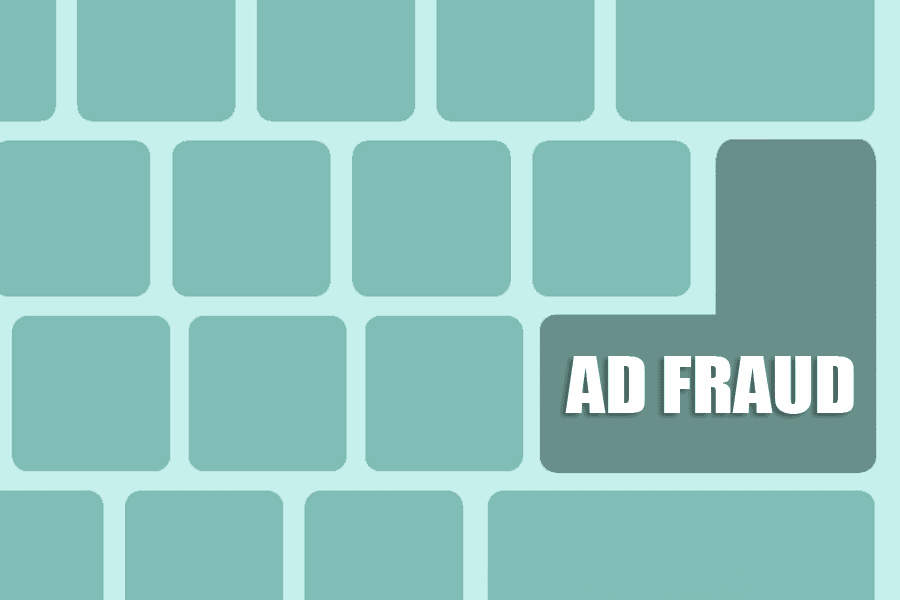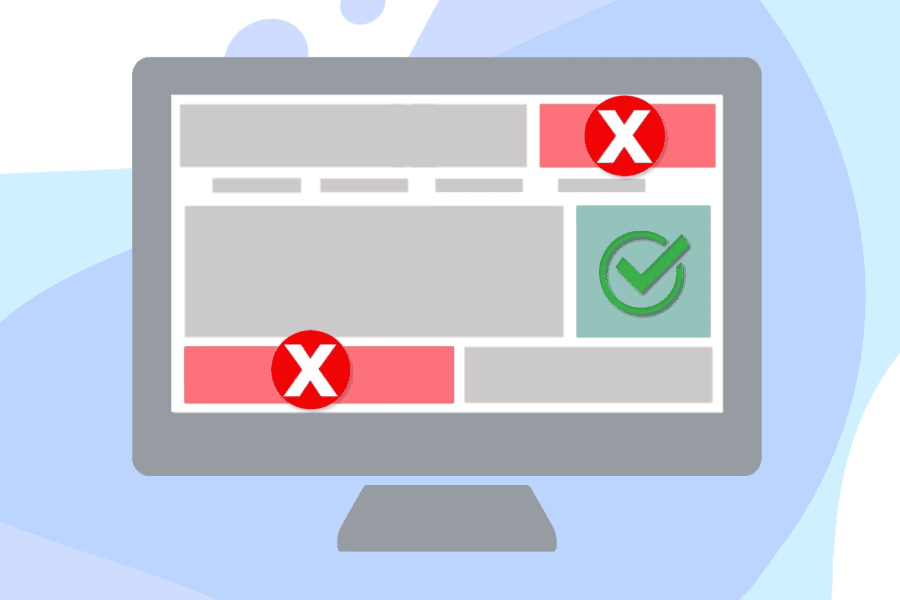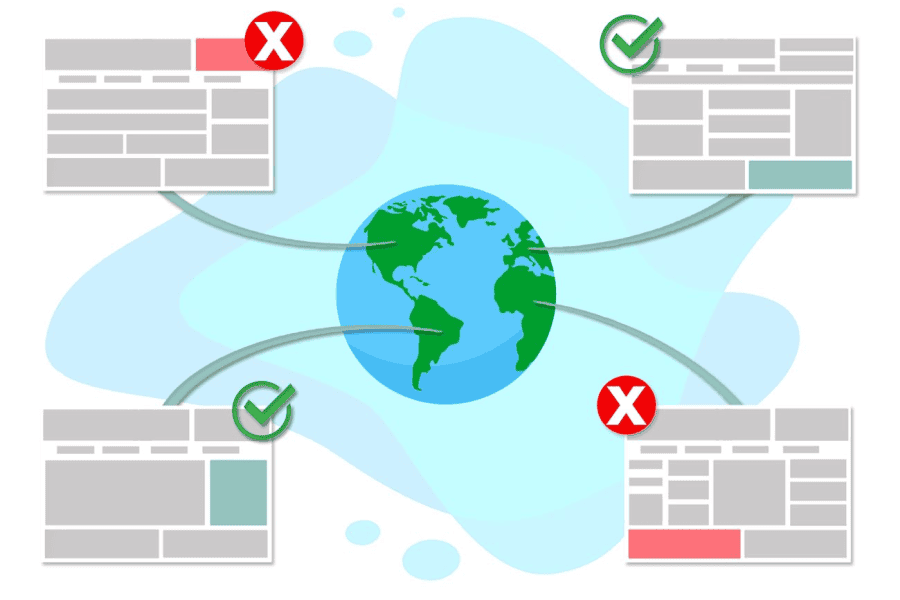How Proxy Networks Help With Ad Verification


Simona Lamsodyte
Last updated -
In This Article
With online ad fraud on the rise, verification quickly becomes a priority for all sorts of advertisers. The global cost of digital advertising fraud is growing year after year and is expected to reach $44 billion by 2022. It’s not just a waste of a company’s ad budget, but it also nullifies any anticipated return on investment from your marketing strategy.
A Quick Guide to Verifying Ads With Proxies
The losses associated with ad fraud aren’t only financial. There’s always a chance your company’s ads will end up on websites hosting illegal content. In that case, your brand’s reputation can take a massive hit along with your marketing budget. Therefore, ad verification has never been more crucial for businesses and advertisers than it is today.
The Most Common Types of Ad Fraud
Advertising fraud is a term encompassing several things - from simulated traffic to fake clicks and impressions originating from bot accounts. Criminals can use multiple methods to counterfeit traffic to their sites. Others stuff their statistics and generate bogus ad clicks, which gets rewarded by the pay-per-click (PPC) advertisement model.
These methods constantly evolve into newer and more creative versions that can take advantage of an unsuspecting advertiser. Thus, ad verification comes as a natural response and an effective practice to deal with these threats.

Here are the most popular techniques fraudsters use:
- Impression laundering and pixel stuffing
Your ads show up on the page but are reduced to a pixel or two. A page can show one or more ads like this. However, since they’re practically invisible, they’re useless. Fraudsters can also “hide” them behind other content (like a pop-under ad) or prevent them from displaying as intended in different ways.
- Fake traffic
Fraudsters create bots that surf the internet, interact with the content, and click on ads. Bots are getting more and more complex, which makes them nearly indistinguishable from genuine human visitors. Their purpose is to drive traffic stats up, which ultimately increases the price of advertising space.
- Ad click fraud
The practice of generating false clicks on PPC ads is probably the most common fraud type out there. While fraudsters can perform it manually, it’s often performed on a massive scale, targeting multiple ad campaigns. In some instances, fraudsters can even run whole farms of fake accounts, making it look like real people interact with your ads. It’s a massive problem for advertisers as it drives up site revenue while minimizing conversion rates and depleting advertising budgets at the same time.
- Domain spoofing
In this case, a fraudster “masks” their site as another company’s domain and deceives buyers into believing their ads will show up on a premium website. This practice can be particularly damaging as you can never be sure if your ads will end up on illegal sites. To make things even worse, they can pop up on malware-ridden pages and severely damage the precious trust you’ve built with your clients.
- Location fraud
This type of fraud is also widespread. A business often pays a premium for its ads to show up in a particular part of the world. Thanks to geolocation, you can target a specific continent, region, country, or even a city for your ads. However, fraudsters can fake location data and get your ads showing up in a completely different location from the one you initially targeted.

What Is Ad Verification and Why It Matters
Your brand is your most precious asset. Since all these malicious practices can severely damage your brand and reputation, high standards for where and how you advertise are necessary. Ad verification is a term that covers all types of action taken to ensure your ads show up on suitable sites, in the proper context, and most importantly, reach your intended audience.
Most advertisers employ an ad verification service to ensure their marketing campaigns run smoothly - content, website parameters, and location. By adding verification tags to the ad markup, they can gather data on the content of a site displaying the ads. This data goes back to the advertiser or an ad verification business and helps to analyze performance, placement, and other factors.
Ad verification services have several different methods of tracking and preventing various types of ad manipulation. As these frauds get more elaborate, keeping up is a never-ending struggle. Developing advanced solutions is a must in this race, and that’s where proxies come into play.
What Makes Residential Proxies Crucial in Ad Fraud Detection
The only successful way to battle ad fraud is using tech that simulates genuine users. When a fraudster suspects an ad verification service is doing its job, they primarily respond by blocking IP addresses. By utilizing residential proxy servers, it’s possible to pinpoint all the issues that prevent ads from showing up as intended in front of the targeted audience.
As we already established, there are numerous types of proxies, the most common being residential and datacenter proxies . While an excellent solution for many different scenarios, datacenter proxies can’t help much with ad verification. Residential proxies are a much better option, and the reason for this lies in their source.
Residential proxies come from internet service providers (or ISPs) and have an authentic IP address, just like a genuine internet user. In other words, they’re indistinguishable. This key characteristic makes it impossible for ad fraudsters to recognize ad verification services and act accordingly.
On the other hand, datacenter proxies come from corporations, cloud services , and similar sources. They’re not tied to any ISP, which means their IPs don’t come from genuine users. This makes them easy to detect, which is a massive disadvantage in ad verification.
Here’s a short overview of a standard ad verification process:
- An ad verifying service will set up trackers (or beacons) while hiding their activity.
- The process utilizes beacons or tags included in the ad markup.
- The service analyzes the content of the publisher’s pages and its appropriateness.
- They put together a report of the findings and send it to the agency or the advertiser.
It’s important to note that while the ad verification process itself won’t automatically stop suspicious ads from running, the information collected this way will pinpoint fraudulent publishers and blacklist them.

Key Challenges in Ad Verification
As we’ve seen, preventing ad fraud comes with several challenges. Fortunately, residential proxies successfully help deal with most of them to make the process easier and more effective. Here are some key issues you can run into while you can run into:
- IP blocking
If your IP gets blocked, the whole ad verification procedure comes to a halt, and there’s no way to proceed. With residential proxies, it’s impossible for fraudsters to detect you and block your IP address.
- Location restrictions
Without a proxy, you can only see and verify ads intended for the country, state, or even city you’re in. Successful fraud detection is not possible without access to ads regardless of the location. With a reliable residential proxy service that offers genuine IP addresses from all over the world, you can check any ad regardless of geolocation targeting.
- Anonymity
A key to successful ad fraud detection is strict anonymity. If a fraudster can’t distinguish you from genuine visitors and can’t tell where in the world you’re coming from, there’s nothing they can do to prevent the verification process.
To Wrap It Up
Online advertising fraud techniques are constantly evolving. Whether it’s ad manipulation, draining marketing budgets, generating fraudulent traffic, or corrupting statistics, the internet will never run out of entities willing to take advantage of unsuspecting advertisers. Fortunately, with the help of residential proxy services in ad verification, you can make sure your marketing campaigns go smoothly, get to the targeted audience, and your brand reputation stays protected.

Author
Simona Lamsodyte
Content Manager
Equally known for her brutal honesty and meticulous planning, Simona has established herself as a true professional with a keen eye for detail. Her experience in project management, social media, and SEO content marketing has helped her constantly deliver outstanding results across various projects. Simona is passionate about the intricacies of technology and cybersecurity, keeping a close eye on proxy advancements and collaborating with other businesses in the industry.
Learn more about Simona Lamsodyte